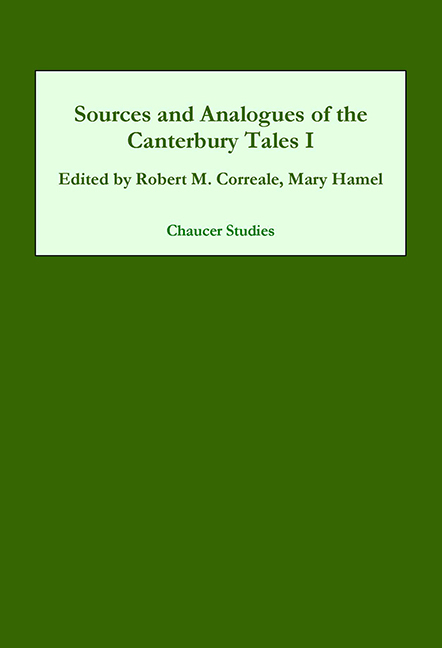Book contents
- Frontmatter
- Contents
- preface
- Acknowledgements
- The Frame
- The Reeve's Tale
- The Cook's Tale
- The Friar's Tale
- The Clerk's Tale
- The Squire's Tale
- The Franklin's Tale
- The Pardoner's Prologue and Tale
- The Tale of Melibee
- The Monk's Tale
- The Nun's Priest's Tale
- The Second Nun's Prologue and Tale
- The Parson's Tale
- Contributors and editors
- General Index
- Index of Manuscripts
The Nun's Priest's Tale
Published online by Cambridge University Press: 25 October 2017
- Frontmatter
- Contents
- preface
- Acknowledgements
- The Frame
- The Reeve's Tale
- The Cook's Tale
- The Friar's Tale
- The Clerk's Tale
- The Squire's Tale
- The Franklin's Tale
- The Pardoner's Prologue and Tale
- The Tale of Melibee
- The Monk's Tale
- The Nun's Priest's Tale
- The Second Nun's Prologue and Tale
- The Parson's Tale
- Contributors and editors
- General Index
- Index of Manuscripts
Summary
Central to the Chaucer canon, the Nun's Priest's Tale in its broadest outlines represents a genre as familiar to modern audiences as to Chaucer's, the beast fable. However, the simple skeleton of a fable plot is here fleshed out with material from a largely medieval genre, the beast epic, and this hybrid creation is adorned with exempla and rhetorical flourishes drawn from biblical and scholastic commentary, notably in Chauntecleer's and Pertelote's debate on the significance of dreams. In the later Middle Ages beast fables not only comprised an important part of the Latin grammar-school curriculum but also had a lively history in sermons, visual arts, and popular literature. The best known beast epic, the Old French Roman de Renart, was compiled by Pierre de St. Cloud in the late twelfth and early thirteenth centuries. It exists in fourteen full-length manuscripts, and numerous others reproducing only one of the compilation's two branches; the poem also spawned many imitations.
The major questions about the sources and analogues of this tale, many of which were raised but not authoritatively answered by Kate Oelzner Petersen in her 1898 monograph On the Sources of the Nonne Prestes Tale, have in the past thirty years found some resolution, primarily in the work of Robert A. Pratt. Petersen discussed and reproduced a number of texts showing a variety of degrees of similarity to Chaucer's tale, but she sketched the tale's fabulistic pedigree only within a very broad folkloric context (pp. 1–9), and then asserted that in spite of the tale's debt to the French Renart literature, its closest surviving relative is Reinhart Fuchs, a German beast epic extant in only three manuscripts. Having examined possible sources for Chauntecleer's longest exempla on the reliability of dreams, Petersen concluded that while both were available in the works of Cicero and Valerius Maximus, Chaucer probably borrowed them from two sections of a book which he (like his contemporaries Thomas Hoccleve and John Lydgate) certainly knew, Dominican Robert Holkot's Super Libros Sapientiae, a commentary on the biblical Books of Wisdom (pp. 98–111).
- Type
- Chapter
- Information
- Sources and Analogues of the Canterbury Tales: vol. I , pp. 449 - 490Publisher: Boydell & BrewerPrint publication year: 2002



